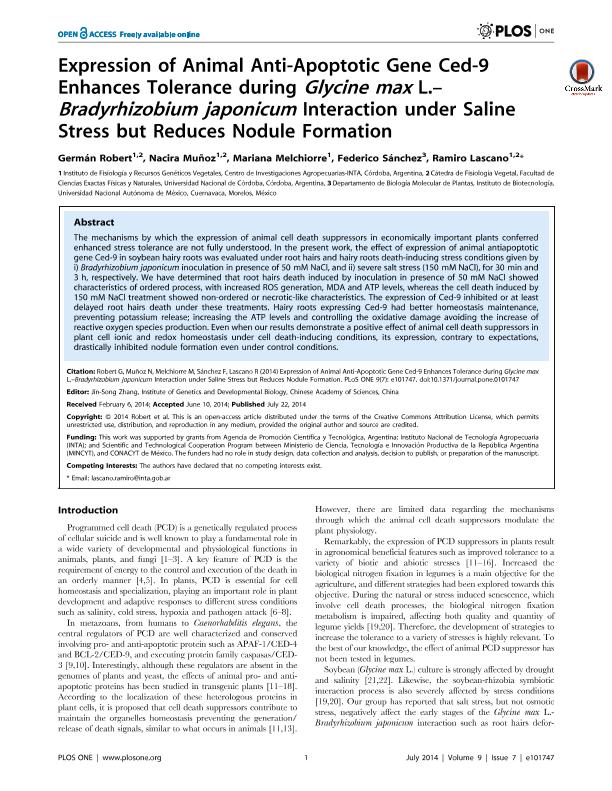Artículo
Expression of Animal Anti-Apoptotic Gene Ced-9 Enhances Tolerance during Glycine max L.-Bradyrhizobium japonicum Interaction under Saline Stress but Reduces Nodule Formation
Robert, Germán ; Muñoz, Nacira Belén
; Muñoz, Nacira Belén ; Melchiorre, Mariana Noemi
; Melchiorre, Mariana Noemi ; Sanchez, Federico; Lascano, Hernan Ramiro
; Sanchez, Federico; Lascano, Hernan Ramiro
 ; Muñoz, Nacira Belén
; Muñoz, Nacira Belén ; Melchiorre, Mariana Noemi
; Melchiorre, Mariana Noemi ; Sanchez, Federico; Lascano, Hernan Ramiro
; Sanchez, Federico; Lascano, Hernan Ramiro
Fecha de publicación:
07/2014
Editorial:
Public Library of Science
Revista:
Plos One
ISSN:
1932-6203
Idioma:
Inglés
Tipo de recurso:
Artículo publicado
Clasificación temática:
Resumen
The mechanisms by which the expression of animal cell death suppressors in economically important plants conferred enhanced stress tolerance are not fully understood. In the present work, the effect of expression of animal antiapoptotic gene Ced-9 in soybean hairy roots was evaluated under root hairs and hairy roots death-inducing stress conditions given by i) Bradyrhizobium japonicum inoculation in presence of 50 mM NaCl, and ii) severe salt stress (150 mM NaCl), for 30 min and 3 h, respectively. We have determined that root hairs death induced by inoculation in presence of 50 mM NaCl showed characteristics of ordered process, with increased ROS generation, MDA and ATP levels, whereas the cell death induced by 150 mM NaCl treatment showed non-ordered or necrotic-like characteristics. The expression of Ced-9 inhibited or at least delayed root hairs death under these treatments. Hairy roots expressing Ced-9 had better homeostasis maintenance, preventing potassium release; increasing the ATP levels and controlling the oxidative damage avoiding the increase of reactive oxygen species production. Even when our results demonstrate a positive effect of animal cell death suppressors in plant cell ionic and redox homeostasis under cell death-inducing conditions, its expression, contrary to expectations, drastically inhibited nodule formation even under control conditions.
Palabras clave:
Tolerance
,
Soybean
,
Rhizobia
,
Anti-Apoptotic
Archivos asociados
Licencia
Identificadores
Colecciones
Articulos(CCT - CORDOBA)
Articulos de CTRO.CIENTIFICO TECNOL.CONICET - CORDOBA
Articulos de CTRO.CIENTIFICO TECNOL.CONICET - CORDOBA
Citación
Robert, Germán; Muñoz, Nacira Belén; Melchiorre, Mariana Noemi; Sanchez, Federico; Lascano, Hernan Ramiro; Expression of Animal Anti-Apoptotic Gene Ced-9 Enhances Tolerance during Glycine max L.-Bradyrhizobium japonicum Interaction under Saline Stress but Reduces Nodule Formation; Public Library of Science; Plos One; 9; 7; 7-2014; 1-11; e101747
Compartir
Altmétricas



